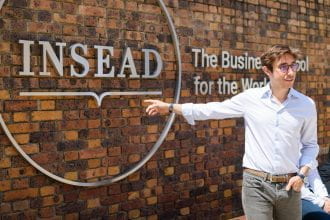INSEAD students help a network of South African healthcare clinics develop a strategy for growth
At INSEAD, the work of “advancing business as a force for good” starts in the classroom, where an innovative approach to teaching prepares students to transform business and society in novel ways.
The Master Strategist Day (MSD) serves as a prime example. Part of the core strategy course in INSEAD’s MBA programme, MSD challenges students to practice strategy with a real organisation — and apply the frameworks they’ve learned in class to make a meaningful difference.
To prepare for the demands of MSD, students conduct a detailed analysis of a specific industry in the weeks leading up to the event. On the day of MSD, they divide into sections to analyse an organisation’s pressing strategic issue, and then develop recommendations for the organisation with support from mentors from Bain & Company. At the end of the day, a select number of students are invited to present their ideas to the organisation’s CEO and a panel of judges from INSEAD.
This year, the organisation selected for MSD was the Unjani Clinic, a network of nurse-owned and nurse-operated healthcare clinics in South Africa that provide affordable care to underserved communities. The strategic challenge: How to grow Unjani’s network of clinics to 1,000 by 2030 while building sustainability into the model.
Associate Professor of Strategy Ithai Stern chose Unjani after studying and writing a case study about the organisation with his colleague, Ridhima Aggarwal, The Salmon and Rameau HMI Research Programme Manager. Stern saw an opportunity to “use the frameworks, the knowledge and the experience we’ve accumulated at INSEAD to help an organisation achieve a positive outcome,” he says. “By utilising business concepts and models, Unjani can provide primary healthcare to thousands and, in the future, millions of South Africans who wouldn’t otherwise have access to it.”
The newly launched Hoffmann Global Institute for Business and Society played an integral role in this year’s MSD. In addition to providing financial support for case development, the Institute collaborated with faculty in INSEAD’s core operations and core marketing courses to teach the Unjani case, effectively extending and enriching the learning that started in MSD.
“This is a perfect illustration of what we are trying to do in the Hoffmann Institute under the ‘learning pillar’ of our strategy,” says Katell Le Goulven, Executive Director of the Institute. “The ultimate outcome is to inspire and equip leaders and managers to integrate social and environmental impact into the heart of their businesses. We want to put students in contexts where they’re using both their brains and their tools to address issues. We want to peel off biases and open minds.”
New this year, students are invited to bid for a “Business as a Force for Good Practicum” for P3 that will involve more hands-on work with the Unjani Clinic. Students enrolled in the elective will identify knowledge gaps in Unjani personnel and then travel to South Africa to provide relevant training to nurses leading the clinics. A team of PhD students will also accompany the group to conduct research that will inform Unjani’s growth strategy.
Stern hopes that INSEAD’s relationship with Unjani will continue beyond this academic year. “As long as we feel we are making a positive impact on the ground, and there is demand and willingness among our MBA students, we will try to send to team dedicated to Unjani,” he says. “It’s in the interest of everyone to help non-profits like Unjani become more efficient and realise their important goals.”


